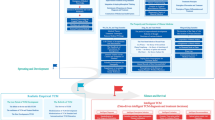Abstract
Syndrome differentiation is a key feature of Chinese medicine (CM) system. With CM receiving more and more attention from the mainstream medical systems, researchers from both traditional medical systems and the Western medical system are putting more effort into studying why and how the CM system works, particularly about CM syndromes. This paper reviews the current status of syndrome study and its future development. The major aspects include: (1) Usage of syndrome differentiation in clinical practice; (2) Formalization of syndrome diagnostic criteria; (3) Evidence-based determination of the common syndrome(s) of a disease; (4) Systems biology study of syndromes; and (5) Usage of syndrome in randomized controlled trials. It is expected to integrate the syndrome concept into the main stream medical system, in terms of diagnosis, treatment and prevention.
Similar content being viewed by others
References
Hu W. Analysis of exports of Chinese proprietary medicine in 2012. Modern Chin Med (Chin) 2014;15:329–332.
Berman BM, Lao LX, Langenberg P, Lee WL, Gilpin AM, Hochberg MC. Effectiveness of acupuncture as adjunctive therapy in osteoarthritis of the knee. Ann Intern Med 2004;141:901–910.
Karlson G, Bennicke P. Acupuncture in asthmatic children: a prospective, randomized, controlled clinical trial of efficacy. Altern Ther Health Med 2013;19(4):13–19.
Shen ZY. Reference criteria of deficiency syndrome diagnosis. Chin J Integr Tradit West Med (Chin) 1983;3(2):117.
First Conference of Blood Stasis of Society of Integrated Traditional and Western Medicine. Diagnosis criteria of blood stasis (tentative). Chin J Integr Tradit West Med (Chin) 1983;3(3):Cover page 2.
Shen ZY. Reference criteria of deficiency syndrome diagnosis (Revised in May 1986). Chin J Integr Tradit West Med (Chin) 1986;6:508.
Ministry of Health. Guideline of clinical research about new Chinese medicine drug development. Ministry of Health, PRC, 1993.
Zhang LT, Zhang MX. Briefl y multivariate analysis methods in the study of traditional Chinese medicine syndrome or syndrome complex. J Pract Tradit Chin Internal Med (Chin) 2012;26(9):91–92.
Shi ZX, Gu WL, Du JH, Jia HZ, Li G. Scheme of diagnosis criteria revision consideration on blood stasis syndrome. Chin J Integr Med Cardio-/Cerebrovascul Dis (Chin) 2007;5:1037–1039.
Dai X, Gua WX. Review about the standardization of Syndrome diagnosis criteria. J Tradit Chin Med (Chin) 2011;52:168–171.
Zhang BY, ed. Internal medicine of traditional Chinese medicine. Shanghai: Shanghai Scientific and Technical Publisher; 1983:170–173.
Zhou ZY, ed. Internal medicine of traditional Chinese medicine. Beijing: China Traditional Chinese Medicine Publishing House; 2003:261–269.
van der Greef J, van Wietmarschen H, Schroën J, Wang M, Hankemeier T, Xu G. Systems biology-based diagnostic principles as pillars of the bridge between Chinese and Western medicine. Planta Med 2010;76:2036–2047.
van der Greef J. Perspective: all systems go. Nature 2011;480(7378):S87.
Liu R, Zhang MX. Application of metabonomics in the study of TCM syndrome. J Pract Tradit Chin Intern Med (Chin) 2013;27(3):91–93.
Li R, Ma T, Gu J, Liang X, Li S. Imbalanced network biomarkers for traditional Chinese medicine syndrome in gastritis patients. Sci Rep 2013;3:1543.
Zhang AH, Sun H, Qiu S, Wang XJ. Recent highlights of metabolomics in Chinese medicine syndrome research. Evid Based Complement Alternat Med 2013;2013:402159.
Li Q, Liu X. Review on the current status of animal model of traditional Chinese medicine syndrome with cancer. J Tradit Chin Med (Chin) 2010;51:1041–1043.
Li XH, Yang LQ. Review on animal model of traditional Chinese medicine syndrome. J Guangxi Tradit Chin Med Univ (Chin) 2012;15:78–80.
Cheng CW, Bian ZX, Li YP, Moher D, Wu TX, Dagenais S, et al. Consort Serial 1: How to explain the methodological rationale of randomized controlled trial on tradition Chinese medicine? Chin J Evid-based Med 2008;8:152–154.
He Y, Lu A, Lu C, Zha Y, Yan X, Song Y, et al. Symptom combinations assessed in traditional Chinese medicine and its predictive role in ACR20 efficacy response in rheumatoid arthritis. Am J Chin Med 2008;36:675–683.
Author information
Authors and Affiliations
Corresponding author
Rights and permissions
About this article
Cite this article
Bian, Zx., Xu, H., Lu, Ap. et al. Insights of Chinese medicine syndrome study: From current status to future prospects. Chin. J. Integr. Med. 20, 326–331 (2014). https://doi.org/10.1007/s11655-014-1808-4
Received:
Published:
Issue Date:
DOI: https://doi.org/10.1007/s11655-014-1808-4




